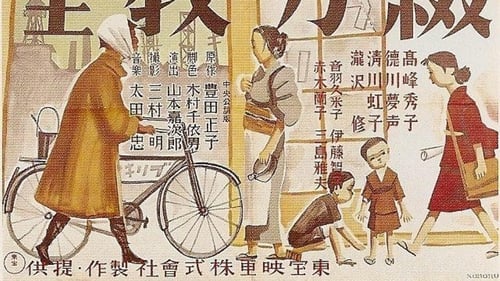
A punk-yakuza-fantasy comedy set in Onomichi.

Executive Producer
A comedy about two salarymen who routinely degrade themselves for their boss.

Executive Producer
Reputedly based on Frank Capra’s 1939 film Mr. Smith Goes to Washington, A Descendant of Tarô Urashima is about a repatriated soldier who becomes populist politician in the Japanese Happiness Party.

Producer
This epic depicts the battle between Uesugi Kenshin and Takeda Shingen. The focus of the story is the struggle by the unit leader in charge of the main supply wagons and the supply troops to transport materiel to the Uesugi army. To this are added episodes involving an itinerant woman.

Executive Producer
Ine Onoda, the eldest daughter of a poor family of farmers, raises a colt from birth and comes to love the horse dearly. When the horse is grown, the government orders it auctioned and sold to the army. Ine struggles to prevent the sale.

Executive Producer
A Japanese army engineer (Hasegawa) on the mainland must put his personal feelings for a beautiful Chinese woman (Ri) aside if he is to succeed at building a highway through the "bandit"- (aka anti-Japanese militia-) infested hinterlands.

Producer
Song of the White Orchid was a co-production of Toho and Mantetsu, the railway that served the colonial region of Manchuria, and the first film in the Kazuo Hasegawa/Shirley Yamaguchi (Ri Koran) “Continental Trilogy.” Handsome Hasegawa (representing Japan) runs up against an impertinent Yamaguchi (representing the continent); not surprisingly, in the course of the film the woman comes around and realizes the benevolent intentions of the Japanese. In Song of the White Orchid Yamaguchi leaves Hasegawa, who plays an expatriate working for the railway, because of a misunderstanding. She joins a communist guerilla group plotting to blow up the Manchurian railway. Learning of the subterfuge that led to the misunderstanding, she renews her faith in Hasegawa—and by extension Japan—and tries to undermine the plot.

Executive Producer
This film attempts to reconstruct the tension of the Battle of Shanghai through an episode in an understated way, introducting its story in a documentary mode. In the film story, Japan's marine regiment protects Japanese residents and Chinese refugees-women and young children-from rampant street fighting, Shanhai Rikusentai unsparingly uses its first eight minutes for an official-mannered self-justification of the war. From the viewpoint of explaining Japan's military operation,the narration refers to the city s spatial division in sync with maps on screen.

Executive Producer
По роману Кавагути Мацутаро. Цурудзиро исполняет национальные песни, Цурухати аккомпанирует ему на сямисэне. Их дуэт пользуется популярностью. Но Цурудзиро слишком много требований предъявляет к музыке девушки. Вскоре дуэт распадается, а Цурухати выходит выгодно замуж, но продолжает тосковать по музыке и совместным выступлениям.

Executive Producer
13-летняя Масако живет в бедном районе на окраине Токио. Её перспективы, как и у остальной семьи, не очень радужны. Однако учитель отмечает её способности и побуждает её продолжать учиться, чтобы иметь возможность пройти дополнительное обучение и повысить свои шансы в жизни. Семья Масако еле-еле находит средства на пропитание, мать даже от безысходности подумывает продать дочку в дом гейш, все эти невесёлые перспективы угрожают дальнейшему образованию девочки.

Producer
Последний фильм режиссера Итами был вдохновлен романом Виктора Гюго «Отверженные». События перенесены во времена юго-западной войны 1877 года в Японии, которая была последней гражданской войной в стране.







